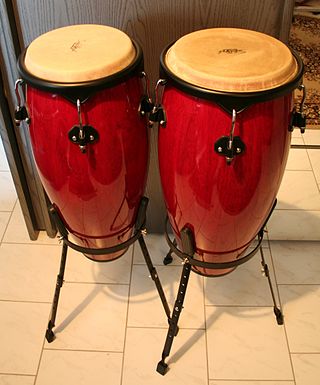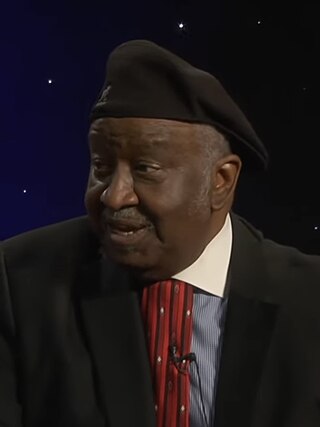
Salsa music is a style of Caribbean music, combining elements of Cuban, Puerto Rican, and American influences. Because most of the basic musical components predate the labeling of salsa, there have been many controversies regarding its origin. Most songs considered as salsa are primarily based on son montuno and son Cubano, with elements of cha-cha-chá, bolero, rumba, mambo, jazz, R&B, rock, bomba, and plena. All of these elements are adapted to fit the basic Son montuno template when performed within the context of salsa.

Rubén Blades Bellido de Luna, known professionally as Rubén Blades, is a Panamanian musician, singer, composer, actor, activist, and politician, performing musically most often in the salsa, and Latin jazz genres. As a songwriter, Blades brought the lyrical sophistication of Central American nueva canción and Cuban nueva trova as well as experimental tempos and politically inspired Son Cubano salsa to his music, creating "thinking persons' (salsa) dance music". Blades has written dozens of hit songs, including "Pedro Navaja" and "El Cantante". He has won twelve Grammy Awards out of 20 nominations and eleven Latin Grammy Awards.

Fania Records is a New York–based record label founded by Dominican-born composer and bandleader Johnny Pacheco and his American lawyer Jerry Masucci in 1964. The label took its name from a popular luncheonette frequented by musicians in Havana, Cuba that Masucci frequented when he worked for a public relations firm there during the pre-Castro era. Fania is known for its promotion of salsa music.

Juan de Dios Ventura Soriano, better known as Johnny Ventura nicknamed El Caballo Mayor, was a Dominican singer and band leader of merengue and salsa.
Boogaloo or bugalú is a genre of Latin music and dance which was popular in the United States in the 1960s. Boogaloo originated in New York City mainly by stateside Puerto Ricans with African American music influences. The style was a fusion of popular African American rhythm and blues (R&B) and soul music with mambo and son montuno, with songs in both English and Spanish. The American Bandstand television program introduced the dance and the music to the mainstream American audience. Pete Rodríguez's "I Like It like That" was a famous boogaloo song.
Héctor Juan Pérez Martínez, better known as Héctor Lavoe, was a Puerto Rican salsa singer. Lavoe is considered to be possibly the best and most important singer and interpreter in the history of salsa music because he helped to establish the popularity of this musical genre in the decades of 1960s, 1970s and 1980s. His personality, style and the qualities of his voice led him to a successful artistic career in the whole field of Latin music and salsa during the 1970s and 1980s. The cleanness and brightness of his voice, coupled with impeccable diction and the ability to sing long and fast phrases with total naturalness, made him one of the favorite singers of the Latin public.

Raymundo "Ray" Barretto Pagán was an American percussionist and bandleader of Puerto Rican descent. Throughout his career as a percussionist, he played a wide variety of Latin music styles, as well as Latin jazz. His first hit, "El Watusi", was recorded by his Charanga Moderna in 1962, becoming the most successful pachanga song in the United States. In the late 1960s, Barretto became one of the leading exponents of boogaloo and what would later be known as salsa. Nonetheless, many of Barretto's recordings would remain rooted in more traditional genres such as son cubano. A master of the descarga, Barretto was a long-time member of the Fania All-Stars. His success continued into the 1970s with songs such as "Cocinando" and "Indestructible". His last album for Fania Records, Soy dichoso, was released in 1990. He then formed the New World Spirit jazz ensemble and continued to tour and record until his death in 2006. He is the father of American vocalist and saxophonist Chris Barretto, best known for his work with Periphery and Monuments.
Carlos Manuel "Charlie" Palmieri was a Puerto Rican bandleader and musical director of salsa music. He was known as the "Giant of the Keyboards".
Gilberto Miguel Calderón, known professionally as Joe Cuba, was an American conga drummer of Puerto Rican descent widely regarded as the "Father of Latin Boogaloo".
Ismael Miranda, also known as El Niño Bonito de la Salsa is a Puerto Rican singer and songwriter.

Bataan Nitollano, also known as Joe Bataan is a Filipino and American Latin soul singer, songwriter and musician best known world-wide and in the Hispanic and Latino music scene as the "King of Latin Soul".

Salvador "Sal" Cuevas was an American salsa bassist known for his association with the Fania All-Stars from 1978 to 1985. Although he played the upright bass, he was one of the most popular electric bassists in the New York salsa scene, often playing in a funk style. "He was the first to bring the slaps and funk style that he learned from R&B, Funk, and Jazz music, into Salsa music."according to Billy Idol, Sal Cuevas came up with the base for “ Eyes without a face” Billy was looking for a sound that was powerful enough that would compliment the dark unromantic lyrics.

Juan Pablo Knipping Pacheco, known as Johnny Pacheco, was a Dominican musician, arranger, composer, bandleader, and record producer. Born in the Dominican Republic, Pacheco became a leading figure in the New York salsa scene in the 1960s and 1970s as the founder and musical director of Fania Records.

Bernard Lee "Pretty" Purdie is an American drummer, and an influential R&B, soul and funk musician. He is known for his precise musical time-keeping and his signature use of triplets against a half-time backbeat: the "Purdie Shuffle." He was inducted into the Modern Drummer Hall of Fame in 2013.
Ángel Santos Vega Colon, aka Santitos Colón, was a Puerto Rican bolero and mambo singer, born in Sabana Grande, Puerto Rico and raised in Mayagüez. He was also known by the moniker: "The Man with The Golden Voice".

Louie Ramirez was an American boogaloo, salsa and latin jazz percussionist, vibraphonist, band leader and composer. He co-wrote with Johnny Pacheco the 1961 hit "El Güiro De Macorina". He has been called "the Quincy Jones of Salsa."
The Lebrón Brothers are a musical family born in Puerto Rico and raised in Brooklyn, New York. The brothers are Pablo, Jose angel, Carlos Frank They provide the vocals and rhythm section of the band. Members of the original band were Gabe Gil - alto sax, Tito Ocasio - timbales, Héctor Lebrón - congas, Eddie DeCupe - trumpet, Elliot Rivera - vocals, Félix Rivera - trumpet. Frankie Lebrón later replaced Frankie Rodríguez who replaced his cousin Héctor Lebrón on congas.
Jimmy Sabater was an American musician of Puerto Rican ancestry. A three-time winner of the ACE Awards, he was a singer and timbales player. He gained international fame thanks to his work with the Joe Cuba Sextet in the 1960s and '70s, and later became the lead singer of various groups including Charlie Palmieri's Combo Gigante. His son, Jimmy Sabater Jr., is a trumpeter and bandleader.

Harvey Averne has been described as "one of several prominent Jewish Americans in New York's bustling Latin music scene."
José Mangual Jr. is an American Salsa percussionist of Puerto Rican descent, singer and composer best known for his recordings with Willie Colón and Héctor Lavoe during the 1960s and 1970s salsa boom in New York.











